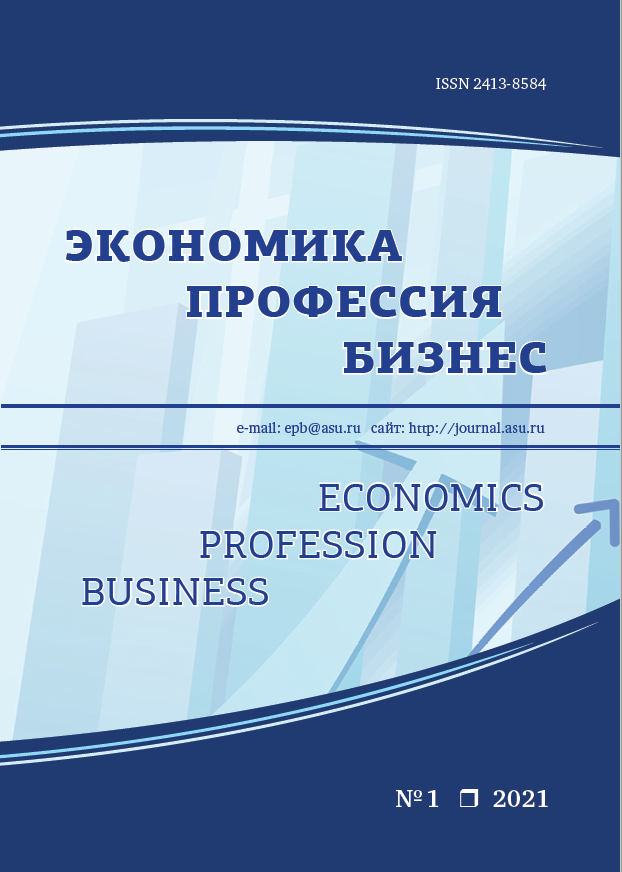ПРОЕКТНОЕ ФИНАНСИРОВАНИЕ ЖИЛИЩНОГО СТРОИТЕЛЬСТВА В РОССИИ: РЕЗУЛЬТАТЫ И ПЕРСПЕКТИВЫ
УДК 332.834 (470)
Аннотация
Жилищное строительство является одним из главных направлений строительной отрасли, выступая при этом мощным драйвером инвестиционного и потребительского спроса. Оно имеет приоритетное социальное значение и вносит значительный вклад в развитие экономики.
В настоящее время в России увеличение объемов жилищного строительства и формирование рынка доступного жилья с помощью развития ипотечного жилищного кредитования — одна из первоочередных задач социально-экономического развития. В последние три года в России сохраняется стабильная положительная динамика ввода жилья. Целевые показатели, установленные национальным проектом, по предварительным оценкам, удалось перевыполнить.
В статье рассмотрен механизм перехода строительства жилья на проектное финансирование. Анализируется динамика открытия счетов эскроу в разрезе регионов России. Проведена оценка реализации программы льготной ипотеки в жилищном строительстве. Аргументирована необходимость дальнейшего совершенствования механизма жилищного кредитования в современных условиях с использованием инструментов государственной поддержки.
Скачивания
Metrics
Литература
Стандарты гарантирования 2018 Москва. URL: https://xn-d1aqf.xn-p1ai/construction_financing/project-finance/ (дата обращения: 19.01.2021).
Стратегия развития строительной отрасли Российской Федерации до 2030 года. Проект 06.12.2019 // Минстрой России / Документы. URL: http://stroystrategy.ru/ (дата обращения: 19.01.2021).
Национальный проект «Жилье и городская среда». URL: https://minstroyrf.gov.ru/trades/natsionalnye-proekty/natsionalnyy-proekt-zhilye-i-gorodskaya-sreda/ (дата обращения: 19.01.2021).
Макаров Д. А., Юденко М. Н. Экономическая эффективность и финансовые риски проектного финансирования в жилищном строительстве // Микроэкономика. 2020. № 2. С. 23-28.
Центральный Банк Российской Федерации. URL: https://www.cbr.ru/content/document/file/112903/analytic_note_20201007_ddkp.pdf/ (дата обращения: 19.01.2021).
Герман С. В., Раковский В. И. Переход на проектное финансирование в жилищном строительстве // Евразийское Научное Объединение. 2020. № 2-3 (60). С. 162-166.
Садыкова А. И. Перспективы применения эскроу-счетов в проектном финансировании жилищного строительства // Финансовая жизнь. 2020. № 2. С. 41-43.
Федеральная служба государственной статистики // Официальная статистика / Строительство. URL: https://www.gks.ru/folder/14458/ (дата обращения: 19.01.2021).
Леванюк В. А., Глотова Н. И. Финансовая безграмотность сельского населения: индивидуальная проблема или проблема государства // Аграрная наука — сельскому хозяйству: сб. ст.: в 2 кн. / XIII Международная научно-практическая конференция (15-16 февраля 2018 г.). Барнаул, 2018. Кн. 1. С. 155-157.
Глотова Н. И., Фасенко Т. Е. Влияние социально-экономических факторов на развитие ипотечного жилищного кредитования // Вестник Финансового университета. 2017. № 3. С. 158-165.
Минфин предложил продлить ипотеку под 6,5% до конца 2021 года. URL: https://realty.rbc.ru/news/5f8418559a794762f6592aca/ (дата обращения: 19.01.2021).
Доскач О. Е., Глотова Н. И. Средняя заработная плата: подходы к определению показателя // Общество. Экономика. Культура: актуальные проблемы, практика решения: сборник научных статей IX Международной научно-практической конференции. В 2 ч. 2019. С. 26-39.
Ипотеку в России выдают на строительство 5 % частных домов. URL: https://www.gipernn.ru/zhurnal/zhile/novosti/dolya-zhilishhnyh-zaymov-na-obekty-izhs-v-rossii-sostavila-5?utm_source=yxnews&utm_medium=desktop/ (дата обращения: 19.01.2021).
Кирсанов А. Р. Проблемные вопросы проектного финансирования жилищного строительства // Имущественные отношения в Российской Федерации. 2020. № 2 (221). С. 7-22.
Никитин М. А. Механизмы проектного финансирования для решения проблем жилищного строительства // Нормирование и оплата труда в строительстве. 2020. № 3. С. 18-22.
REFERENCES
Guarantee standards 2018 Moscow. URL: https: //xn-d1aqf.xn-p1ai/construction_financing/project-finance/ (date of access: 01.19.2021).
Development strategy for the construction industry of the Russian Federation until 2030. Project 06.12.2019 // Ministry of Construction of Russia / Documents. URL: http://stroystrategy.ru/ (date of access: 19.01.2021).
National Project «Housing and Urban Environment». URL: https://minstroyrf.gov.ru/trades/natsionalnye-proekty/natsionalnyy-proekt-zhilye-i-gorodskaya-sreda/ (date of access: 19.01.2021).
Makarov D. A., Yudenko M. N. Economic efficiency and financial risks of project financing in housing construction // Microeconomics. 2020. No. 2. Pp. 23-28.
Central Bank of the Russian Federation. URL: https://www.cbr.ru/content/document/file/112903/analytic_note_20201007_ddkp.pdf/ (date of access: 19.01.2021).
German S. V., Rakovsky V. I. Transition to project financing in housing construction // Eurasian Scientific Association. 2020. No. 2-3 (60). Pp. 162-166.
Sadykova A. I. Prospects for the use of escrow accounts in project financing of housing construction // Financial life. 2020. No. 2. Pp. 41-43.
Federal State Statistics Service // Official Statistics / Construction. URL: https://www.gks.ru/folder/14458/ (date of access: 19.01.2021).
Levanyuk V. A., Glotova N. I. Financial illiteracy of the rural population: an individual problem or a problem of the state // Agrarian science — to agriculture: collection of articles. Art.: in 2 books / XIII International Scientific and Practical Conference (February 15-16, 2018). Barnaul, 2018. Book 1. Pp. 155-157.
Glotova N. I., Fasenko T. E. The influence of socio-economic factors on the development of mortgage housing lending // Bulletin of the Financial University. 2017. No. 3. Pp. 158-165.
The Ministry of Finance proposed to extend the mortgage at 6.5% until the end of 2021. URL: https://realty.rbc.ru/news/5f8418559a794762f6592aca/ (date of access: 19.01.2021).
Doskach O. E., Glotova N. I. Average salary: approaches to determining the indicator // In the collection: Society. Economy. Culture: actual problems, practice of solution. Collection of scientific articles of the IX International Scientific and Practical Conference. In 2 parts. 2019. Pp. 26-39.
Mortgages in Russia are issued for the construction of 5% of private houses. URL: https://www.gipernn.ru/zhurnal/zhile/novosti/dolya-zhilishhnyh-zaymov-na-obekty-izhs-v-rossii-sostavila-5?utm_source=yxnews&utm_medium=desktop/ (date of access: 19.01. 2021).
Kirsanov A. R. Problematic issues of project financing of housing construction // Property relations in the Russian Federation. 2020. No. 2 (221). Pp. 7-22.
Nikitin M. A. Mechanisms of project financing for solving problems of housing construction // Rationing and wages in construction. 2020. No. 3. Pp. 18-22.
Copyright (c) 2021 Наталья Ивановна Глотова

Это произведение доступно по лицензии Creative Commons «Attribution» («Атрибуция») 4.0 Всемирная.
Авторы, публикующиеся в данном журнале, соглашаются со следующими условиями:
a. Авторы сохраняют за собой права на авторство своей работы и предоставляют журналу право первой публикации этой работы с правом после публикации распространять работу на условиях лицензии Creative Commons Attribution License, которая позволяет другим лицам свободно распространять опубликованную работу с обязательной ссылокой на авторов оригинальной работы и оригинальную публикацию в этом журнале.
b. Авторы сохраняют право заключать отдельные договора на неэксклюзивное распространение работы в том виде, в котором она была опубликована этим журналом (например, размещать работу в электронном архиве учреждения или публиковать в составе монографии), с условием сохраниения ссылки на оригинальную публикацию в этом журнале. с. Политика журнала разрешает и поощряет размещение авторами в сети Интернет (например в институтском хранилище или на персональном сайте) рукописи работы как до ее подачи в редакцию, так и во время ее редакционной обработки, так как это способствует продуктивной научной дискуссии и положительно сказывается на оперативности и динамике цитирования статьи









